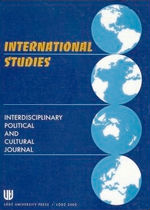THE DISSOLUTION OF THE MONASTERIES AND ITS IMPACT ON EDUCATION IN TUDOR TIMES
THE DISSOLUTION OF THE MONASTERIES AND ITS IMPACT ON EDUCATION IN TUDOR TIMES
Author(s): Marek SmolukSubject(s): History, Modern Age, 16th Century
Published by: Wydawnictwo Uniwersytetu Łódzkiego
Keywords: The reign of Henry VIII; Thomas Cromwell; the dissolution of the monasteries; Tudor education
Summary/Abstract: In 1536 the English Parliament under pressure from Henry VIII and the Lord Chancellor, Thomas Cromwell, gave its consent for the dissolution of the lesser monasteries and abbeys in the king’s realm, and three years later with the sanction of MPs some of the greater religious houses also suffered the same fate. The principal aim of this paper is to assess the importance of this political decision with a view to examining the progress being made in the field of education in England in the middle of the sixteenth century resultant upon this dissolution. The evaluation of the merits and demerits originating from the suppression of the English monasteries is made in terms of both primary and academic education. The answers to these key questions are preceded by a short analysis of the reputation monasteries and abbeys had acquired by that time. Also on a selective basis, some opinions have been presented here to provide an overall picture of the standing of the monks and nuns and their concomitant activities, as perceived through the eyes of English society; the eminent scholars and humanists in particular. Subsequently, before assessing the consequences resulting from the dissolution of the religious houses in England, some consideration is given to the reasoning and rationale which lay behind both Henry VIII and his Lord Chancellor’s political decisions.
Journal: International Studies: Interdisciplinary Political and Cultural Journal (IS)
- Issue Year: 14/2012
- Issue No: 1
- Page Range: 109-120
- Page Count: 12
- Language: English

